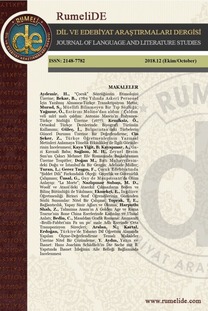Can One Envisage The Garden of Eden Without Eve?
Can One Envisage The Garden of Eden Without Eve?
Eve and Adam, Paradise Lost, The Garden of Eden the Original Sin,
___
- Akalın, Esin. (2008). Paradise Lost: “Guess Who’s Coming to Dinner?”: Representations of Food in British Literature: International Symposium. Proceedings. Ed. Zekiye Antakyalıoğlu. Istanbul. İstanbul Kültür Üniversitesi Yayını. 65-72.
- Dalarun, Jacques. (2000). The Clerical Gaze. A History of Women in the West: Silences of the Middle Ages. Vol. 2. Ed. Christiane Klapisch-Zuber, Cambridge and et. al.: The Belknap Press of Harvard University Press. 15-42.
- Froula, Christine. (1992). When Eve Reads Milton: Undoing the Canonical Economy. John Milton. Ed. Annabel Patterson. Longman Group UK Limited. England. 142-165.
- Hutcherson, Dudley R. (1960) “Milton's Eve and the Other Eves.” Studies in English: Vol. 1. Article 5.
- Available at: https://egrove.olemiss.edu/ms_studies_eng/vol1/iss1/5.
- Letters. The First Letter of Paul to the Corinthians. Corinthians: 11-7. In The New English Bible: Containing the Old and New Testaments (1970).
- Keating, Christine C. (Published online: 30 Apr. 2014). Unearthing The Goddess Within: Feminist Revisionist Mythology in The Poetry of Margaret Atwood. Women’s Studies, Volume 43. 483-501.
- Marvell, Andrew. (1973). “The Garden”. The Oxford Anthology of English Literature. Vol. 1, Eds. Kermode and et. al. New York: Oxford University Press. 1155-1157.
- Mızıkyan, A. (2006). The Monstrous and Grotesque Images of the Feminine in Book 1 of The Faerie Queene and Paradise Lost. [Unpublished PhD Thesis]. İstanbul University.
- Miller, Shannon. (2008). “Serpentine Eve: Milton and the Seventeenth-Century Debate Over Women.” Milton Quarterly 42, no. 1. 44-68.
- Mills, Patricia J. (1987). Woman, Nature, and Psyche. New Haven and London: Yale University Press. Milton, John. (1996). Paradise Lost (1667). England: Penguin Popular Classics.
- Mulvey, Laura. (1998). Visual Pleasure and Narrative Cinema. Literary Theory: An Anthology. Ed. Julia Rivkin, Michael Ryan. Oxford. Blackwell Publishers Ltd. 585-595.
- The New English Bible: Containing the Old and New Testaments (1970). Oxford University Press. Cambridge University Press.
- Patrides C. A. Ed. (1974). John Milton: Selected Prose. Columbia and London. University of Missouri Press.
- Walker, Michelle Boulous. (1998). Woman as Negativity by Kristeva. Philosophy and The Maternal Body: Reading Silence. London and New York. Routledge. 121- 128.
- Wollstonecraft, Mary. (1996). A Vindication of the Rights of Woman (1792). Mineola, New York. Dover Publications.
- ISSN: 2148-7782
- Yayın Aralığı: 6
- Başlangıç: 2014
- Yayıncı: Yakup YILMAZ
Dil felsefesi bağlamında sözler, sesler, işaretler
Kahramanın karanlık yüzü anti-kahraman; tiyatroda karakterin evrimi
İlkokul öğrencilerinin sözcük öğrenme motivasyonu
Hatice VATANSEVER BAYRAKTAR, Senanur KARADAĞ, Şule ÖZTÜRK
Dilek BAYRAKTAR, Neslihan KARAKUŞ
Piyano eşlikli solo eserlerde eşliğin soloya bağımlılık durumunun incelenmesi
Özlem ÖZALTUNOĞLU, Bengisu ÖZYİĞİT
Öznel deneyimlere işitsel tanıklık: Podcast yayıncılıkta yeni bir belgesel anlatısının olanaklılığı
Erken Cumhuriyet dönemi ulus-devlet inşası sürecinde dil devrimi politikaları (1839-1938)
